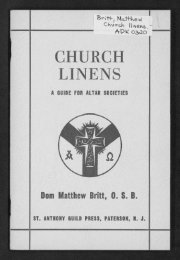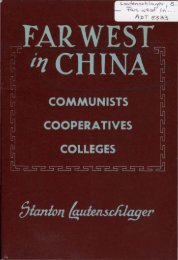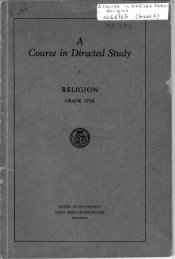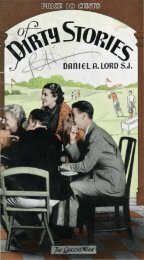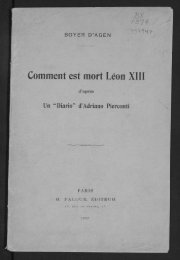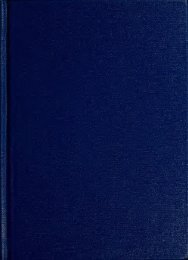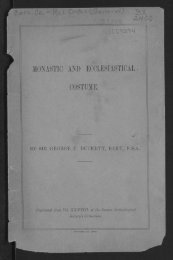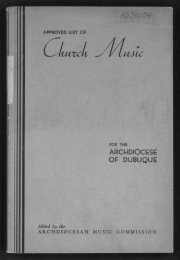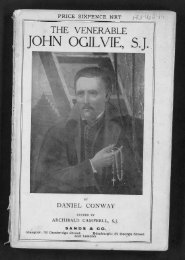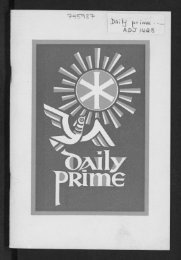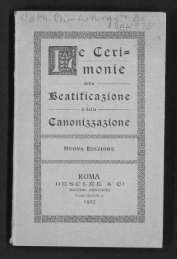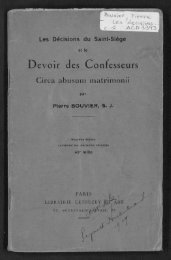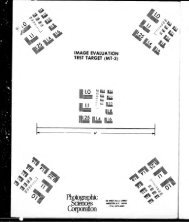r The Catholic Democracy of America,64 - Digital Repository Services
r The Catholic Democracy of America,64 - Digital Repository Services
r The Catholic Democracy of America,64 - Digital Repository Services
You also want an ePaper? Increase the reach of your titles
YUMPU automatically turns print PDFs into web optimized ePapers that Google loves.
<strong>The</strong> <strong>Catholic</strong> <strong>Democracy</strong> <strong>of</strong> <strong>America</strong>, <strong>64</strong><br />
Bishop Carroll visited Boston in 1791 he was publicly and<br />
privately entertained by Protestant societies and individuals.<br />
Nevertheless at the end <strong>of</strong> the century, when President Adams<br />
was contributing to the building <strong>of</strong> the first <strong>Catholic</strong> church<br />
in New England, following Washington's example in Philadelphia,<br />
Boston contained only 210 Roman <strong>Catholic</strong>s. At the<br />
present day there are 225,000 <strong>Catholic</strong>s among the 400,000<br />
inhabitants <strong>of</strong> the Puritan capital. Yet this prodigious<br />
change is not more amazing than others in the United States<br />
which have been instrumental in causing the increase <strong>of</strong> the<br />
national population, and with it the growth <strong>of</strong> <strong>Catholic</strong>ism.<br />
For example, a visitor to the Centennial Congress last November<br />
might have entered the cars at Baltimore any evening<br />
after dinner, and have heard mass in Boston Cathedral the<br />
next morning; whereas Bishop Carroll, writing from the former<br />
city in 1803, says that by starting thence at the beginning<br />
<strong>of</strong> September he hopes to reach Boston a few days before a<br />
ceremony fixed for Michaelmas.<br />
An ingenious <strong>America</strong>n priest has suggested that the rise<br />
<strong>of</strong> Roman <strong>Catholic</strong>ism in New England was the logical consequence<br />
<strong>of</strong> the Revolution, inasmuch as the proclamation <strong>of</strong><br />
man's natural rights involved the overthrow <strong>of</strong> the whole theological<br />
structure which the reformed theologians built upon<br />
the corner stone <strong>of</strong> man's " total depravity;" the Puritans,<br />
therefore, in signing the Declaration <strong>of</strong> Independence, signed<br />
their own death warrant. <strong>The</strong> weak point in this philosophic<br />
theory is the fact that two generations passed away after the<br />
revolution before Roman <strong>Catholic</strong>ism gained an extensive<br />
domain in Puritan territory. As late as 1822 Mr. Jefferson<br />
wrote: " I trust there is not a young man now born in the<br />
United States who will not die a Unitarian and it is an interesting<br />
study, though this is not the place for it, to trace<br />
how the stern faith <strong>of</strong> the Pilgrim Fathers gave way to the<br />
cultured Arianism <strong>of</strong> Massachusetts, which, after a long reign<br />
among the most highly educated community in <strong>America</strong>, is in<br />
turn being dethroned by less barren creeds. <strong>The</strong> early devel-



